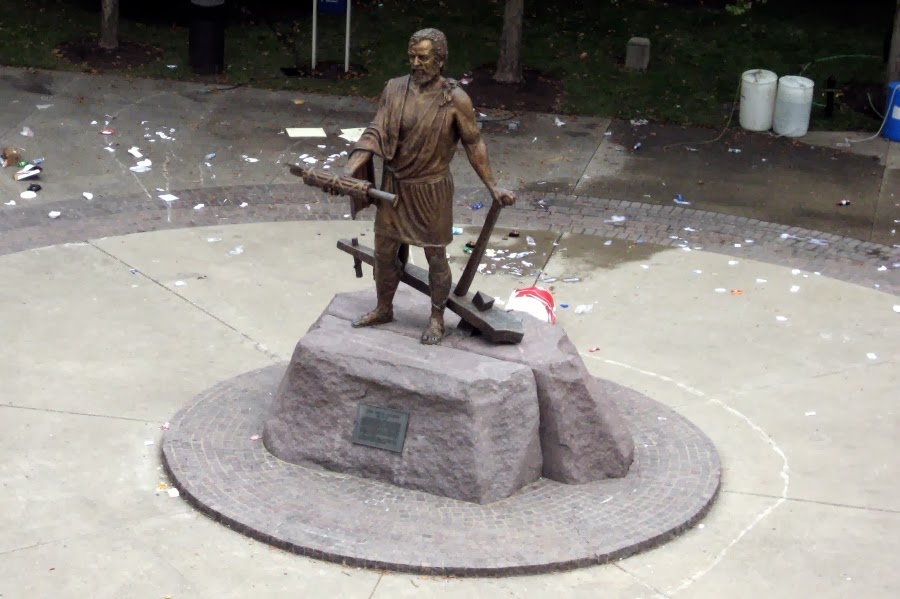 Home Page
Home Page - Lecture.mp3
- Listen in iTunes
- Listen on Stitcher
-
Parallel lecture for Honors 103
Polybius & Livy
Today is citizenship day in our class. In honor of that, let's
begin with a passage from "Rip Van Winkle."
Having nothing to do at home, and being arrived at that happy
age when a man can do nothing with impunity, he took his place
once more on the bench, at the inn door, and was reverenced as
one of the patriarchs of the village, and a chronicle of the
old times "before the war." It was some time before he could
get into the regular track of gossip, or could be made to
comprehend the strange events that had taken place during his
torpor. How that there had been a revolutionary war-that the
country had thrown off the yoke of old England-and that,
instead of being a subject of his Majesty, George III, he was
now a free citizen of the United States.
The change in the relationship between the individual and the
state (from a subject of the king to a citizen of the republic)
was at the time so revolutionary that Winkle had trouble
grasping the concept. We, however, have lived so long as a
republic that we sometimes forget what's necessary for us as
citizens to give back if our republic is to endure.
A successful republic has numerous ingredients, but two
necessary ones are the republican form of government, which we
find in Polybius and many other sources, and the republican
(small 'r') citizen, whose virtues are embodied in the stories
we find in Livy.

I. Polybius
We can't really know who we are if we forget where we came
from. Yet there is widespread confusion among some of our fellow
citizens about the origin of our system. For example, consider
the painting "One
Nation Under God" by Jon McNaughton, an artist who sells
bad art to dumb people. In his imagination, Jesus handed down
the Constitution to the founders as a kind of divine
inspiration. I suppose his thesis is that the United States is a
Christian nation, as though such a thing were possible. So if
our republican form of government didn't come floating down from
heaven while angelic choirs sang in the background, where did it
come from?
The answer of course is Rome. Ancient Rome famously booted out
its last rex (king), and replaced the monarchy with the
republican government:
| Class |
Executive |
Legislative |
Legal |
| Patrician |
2 consuls |
Senate |
Judiciary |
| Plebian |
10 tribunes |
Comita |
If this looks familiar, it should. We replaced the consuls with
a president and vice-president. The tribunal power was to limit
the other powers by forbidding it - the Latin word is veto.
The president has the tribunal power to block bills from taking
effect, and the judiciary has the tribunal power to limit what
powerful people can do the the weak. There the power is called habeas
corpus. Our Senate is based on Rome's Senate, obviously,
and the House of Representatives is based on the Comita. And
Rome was exceedingly proud of its legal system. Justinian
eventually systematized Roman law into a code (as opposed to a
mishmash of sometimes contradictory laws that had been cobbled
together ad hoc over the centuries) into the Justinian
Code. Later still it was systematized once again by Napoleon
into the Napoleonic Code. Louisiana adopted the civil portion of
the code; Rome is never very far away.
So why Rome? Because it's always Rome.
It's ALWAYS Rome.
It's always Rome.
So then why is it always Rome? Consider the ancient world for a
moment: ancient Sumer gave way to the Babylonians, the Perians,
and eventually to Islamic rulers; each civilization led to one
more advanced than the one before. Egypt was followed by Greece
- Alexandria, Egypt was built in honor of Alexander the Great
and was the greatest center of learning of its time. Then Rome
followed and eventually the Islamic countries. And similar
processions of civilizations occurred in Japan, China, India,
etc. Until you get to the Western Roman Empire. When it
collapsed, the following period came to be known as the Dark
Ages. A period which lasted for hundreds of years. The little
flicker of civilization that survived during those centuries was
the Catholic Church, headquartered in Rome.
The attempts to rebuild civilization all sought in some way to
re-establish Rome. From the Holy Roman Empire forward, there
were attempts to re-kindle civilization. When the Euro was
introduced in 2002, the speaker pointed out that this was the
first Europe-wide currency. Since Rome. And now the Euro is
mired in crisis. Sometimes it takes a long time indeed to put
Humpty Dumpty together again.
Western conservatism is rooted in the belief that civilization
is a fragile edifice, like a Jenga block, and that changes
should be moderate and careful lest the whole thing collapse. Of
course, in current America we see a form of right-wing
radicalism that plays Jenga with bowling balls. Their radical
plans for extreme experimenting with society and no clear path
to a positive outcome do not belong to any recognizable form of
conservatism. And if our civilization collapses, this time it
will be the Dark Ages with nukes. Soooo — are you feeling lucky,
punk?

Giant Jenga fail.
II. Livy
The question then is, which Roman do we wish to become? The
answer most often has been Caesar. The Holy Roman Empire led up
to a Holy Roman Emperor. Napoleon had himself crowned Emperor
and First Consul, just to cover his bases. This ambition
affected the very languages involved. What do the German
'Kaiser' and the Russian 'Tsar' have in common? Both words are
derived from 'Caesar.' Caesar started as a name, but after his
death, Octavian adopted the name as his own, and it gradually
became a title. Res publica replaced the monarcy
In contrast to these examples, the leader of the young United
States chose other Roman heroes. Heroes like the first Brutus
(not the one who assassinated Caesar; the one who set up the
Republic and served as one of the first two consuls). George
Washington took as his personal hero Cincinnatus. Cincinnatus
was a Roman senator and general. When word reached Rome that
they were threatened by imminent attack, the Senate appointed
him dictator for 6 months. Because their system of government
was so inefficient (by design), the dictator had absolute power
over all the elements of government and could pass laws, try
people, and exile or execute them. The messengers found him
plowing his field (the plow is behind him in the statue below).
The gave him the fasces that represented his power (in
his right hand). He took over the army, repelled the enemy
quickly, and with months of absolute power ahead of him --
resigned his commission and returned to his plow. Washington
followed his example twice; once at the end of the Revolutionary
War, and the next time after the second term of his presidency.
Since the USA eventually amended the Constitution to limit a
President to two terms because of Washington's example,
Cincinnatus has influenced our constitution. This is one example
of good citizenship from the ancient world making its impact on
American ideas of citizenship. Livy is full of dozens of these.

Early Americans were constantly studying ancient Roman virtues,
which they called civic virtue or republican virtue. It usually
involved putting Rome's welfare ahead of their own welfare and
self-interest. Romans were deeply suspicious of the
consolidation of too much power in the hands of too few people.
In many area, leaders were put on a pedestal -- Gilgamesh was
2/3s god, the Pharoah was the incarnation of divinity on earth,
the king of Israel was a Messiah chosen by God and anointed by
his prophet. The Roman rulers were mere mortals chosen by their
fellow citizens. Not God but the Godfather. It's from the Romans
we got the concept of the consent of the governed and that
authority comes up from the bottom instead of down from the top.
The later example of the Emperor should warn us that when we
hand all our power over to a few rich people or powerful
politicians, we might be a long time getting it back. When you
read Livy, you aren't simply learning his stories or Rome's
stories; you're learning about yourself and your country.
Every moment think steadily as a Roman and a man to do what
thou hast in hand with perfect and simple dignity, and feeling
of affection, and freedom, and justice; and to give thyself
relief from all other thoughts. And thou wilt give thyself
relief, if thou doest every act of thy life as if it were the
last, laying aside all carelessness and passionate aversion
from the commands of reason, and all hypocrisy, and self-love,
and discontent with the portion which has been given to thee.
Thou seest how few the things are, the which if a man lays
hold of, he is able to live a life which flows in quiet, and
is like the existence of the gods; for the gods on their part
will require nothing more from him who observes these things.
Maucus Aurelius

It's almost impossible to overestimate the importance of Rome
to the founders. Just as Rome was named for its pater
patriae (father of the country), Romulus, the new country
built a capital city named for our pater patriae,
Washington. When they bought the land for D.C., one of the
farmers they bought it from renamed a creek through his land the
Tibur. (Note to McNaughton, it wasn't renamed the Jordon, and
the city wasn't named Jerusalem.) They hired eminent French
architect Pierre "Peter" Charles L'Enfant to design the new
city; Jefferson, who was assigned to work with him, told him to
make it look like Rome. The main public buildings in Washington
from that time and for decades thereafter remind us of Rome. The
Lincoln Memorial is a Doric Temple. Even McNaughton's
distressingly bad art fails to completely eliminate the Roman
influence from the background. This is not a secret that we need
Nick Cage to excavate from underneath the Capitol Building; the
buildings scream it. It's also on our money (check the back of
the $1.00 bill. There's Latin on it. What verses of the Bible
does the Latin come from? Take the challenge!) The statue in the
New York harbor isn't a statue of Moses freeing the Israelites;
it's the old Roman goddess Dea Libertas; when ancient
Roman slaves achieved their freedom, they underwent the ritual
of manumission in the temple of Dea Libertas in Rome. If
you examine the feet of the Statue of Liberty, you'll see her
feet are surrounded by the broken chains of freed slaves.
Finally, the Romans measured years by A.U.C. (Anno Urbis Conditae, from the Founding of the City). Early Americans experimented with a new dating system, A.I.A. (Anno Independentiae Americanae, in the year of American independence). This dating system is still preserved in obscure documents like the United States Constitution ("done in Convention by the Unanimous Consent of the States present the Seventeenth Day of September in the Year of our Lord one thousand seven hundred and Eighty seven and of the Independance of the United States of America the Twelfth In witness whereof We have hereunto subscribed our Names") and the Gettysburg Address ("Four score and seven years ago").
I teach the civic virtues of Rome because they are under a
systematic attack in our nation by forces that want our people
to forget that power comes from us, and that we can take that
power back from the ones who want to put all that power into the
hands of some new emperor. If you want to destroy a republic,
convince the citizens to give up their civic virtue.
